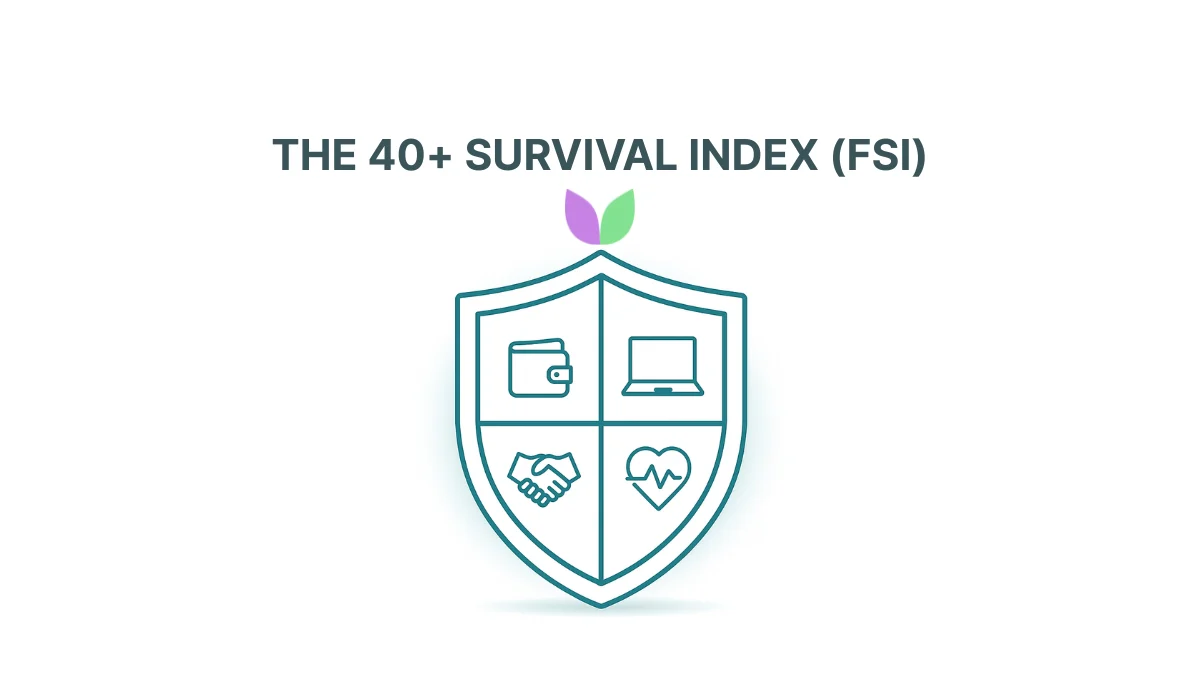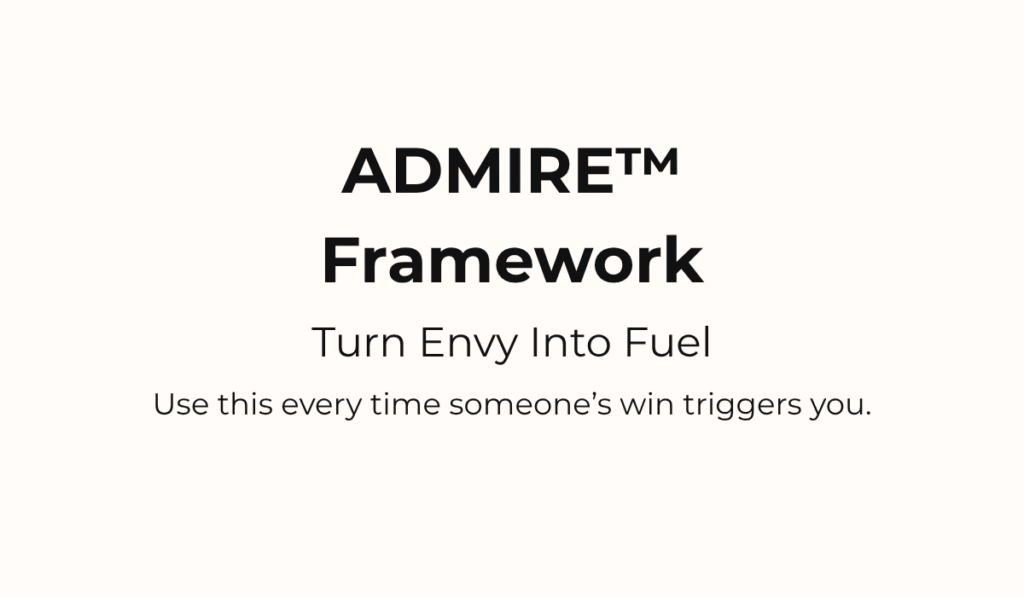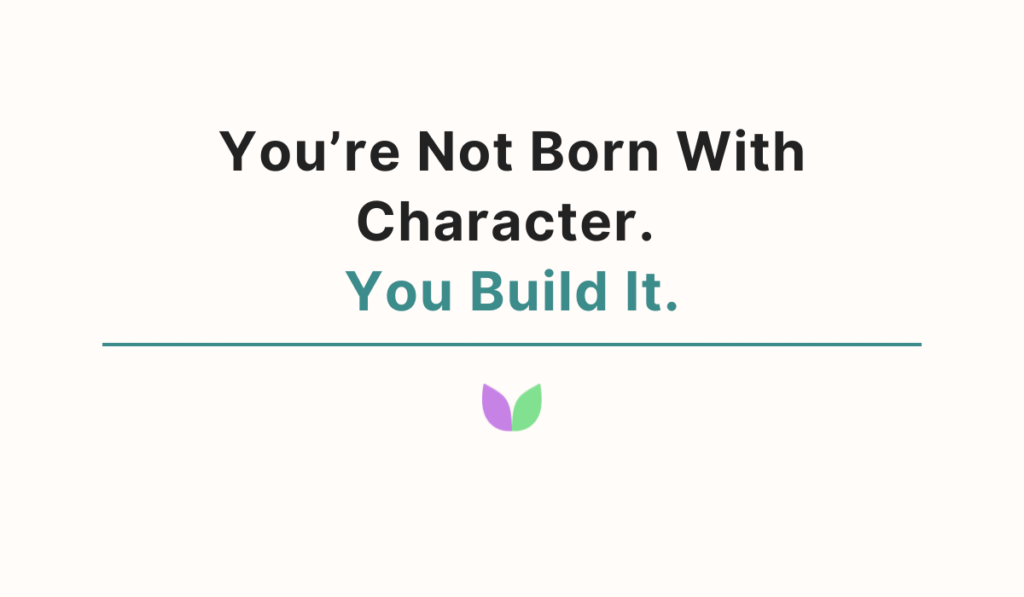Introduction: Why 40+ Feels Like a Breaking Point
At 40+, life is a constant balancing act. Kids are growing, parents are ageing, EMIs never stop, and careers often feel less secure than before.
The illusion of stability is dangerous. On paper, you may look settled — steady income, some savings, and years of experience. But reality is harsher:
- You’re too expensive to be considered “safe.”
- Too senior to be easily “agile.”
- Too young to retire.
The truth is simple: stability at 40+ is a myth. What you really have is exposure.
That’s why we created the 40+ Survival Index (FSI) — a practical self-audit tool to measure your resilience and highlight the reserves you need to build.
What is the 40+ Survival Index (FSI)?
The 40+ Survival Index is a blunt but effective scoring system designed for mid-career professionals. It evaluates your ability to withstand shocks — layoffs, health crises, market downturns, or family pressures.
You score yourself 1–10 across four reserves:
- Cash Liquidity – How many months can you survive without income?
- Career Relevance – Have you added a monetizable skill in the last two years?
- Social Capital – Can you call five people today who would open doors for you?
- Health Reserves – Can your body and mind handle high stress without breaking down?
How to Calculate Your FSI Score
Each reserve is scored on a scale of 1 to 10 (1 = fragile, 10 = rock solid).
Add them up. Your maximum score = 40.
- FSI < 25 → Fragile. Exposed. One shock away from collapse.
- FSI 25–30 → Stretched. Vulnerable. You have gaps that pressure can exploit.
- FSI 30+ → Resilient. Ready. You’ve built strong reserves.
Why Each Reserve Matters
1. Cash Liquidity
Cash is not just money. It’s breathing space.
- Less than six months of survival buffer = danger zone.
- With liquidity, you buy time and avoid desperate decisions.
2. Career Relevance
Experience is valuable, but without upgrades, it ages like outdated software.
- Add at least one monetizable skill every two years.
- Stay employable, adaptable, and in demand.
3. Social Capital
Connections are not about likes or comments. They are about allies.
- Five people who can actively help you when needed = a real network.
- Networks are built before you need them.
4. Health Reserves
Your body and mind are the ultimate shock absorbers.
- Burnout, poor sleep, and chronic stress silently erode resilience.
- Without health, every other reserve becomes fragile.
How IntuiWell Helps You Strengthen Your FSI
At IntuiWell, our Personal Growth Program provides structured, practical playbooks that make these reserves measurable and sustainable:
- Cash Liquidity → The Ladder + Bucket Strategy helps you build a rolling 12-month emergency fund.
- Career Relevance → The 180-Day Skills Roadmap guides you to add one monetizable skill.
- Social Capital → The 5×5 Activation Framework expands your network into five deep allies across five different domains.
- Health Reserves → The 9 AM Edge Protocol resets your energy, focus, and stress before the day hijacks you.
These are not theories. They are actionable systems that create measurable outcomes.
Action Steps: Build Your Personal Growth Portfolio
- Audit Yourself – Score your FSI today.
- Find Your Weakest Link – Circle the lowest number.
- Commit to One Action – In the next 30 days, take one step to strengthen it.
- Repeat and Grow – Over time, your reserves compound into true resilience.
Conclusion: Stability is a Myth, Reserves Are Real
At 40+, the edge isn’t in climbing higher. It’s in building a life portfolio that cannot collapse overnight.
- Cash buys you time.
- Skills buy you relevance.
- Network buys you an opportunity.
- Health buys you longevity.
Your FSI score isn’t a label — it’s a mirror. Use it to see where you stand today and start building the reserves that will carry you through tomorrow.
If you’re ready to grow beyond theory and build resilience step by step, explore the IntuiWell Personal Growth Program — where we turn fragility into strength with proven frameworks.
✅ Blog Summary
The 40+ Survival Index (FSI) is a blunt self-audit tool designed for mid-career professionals who often face hidden fragility despite looking “settled” on paper. At 40+, stability is a myth — EMIs, ageing parents, growing kids, and career insecurity create constant pressure.
The FSI helps you measure resilience across four critical reserves:
- Cash Liquidity → How long can you survive without income.
- Career Relevance → Whether you’ve upgraded with monetizable skills.
- Social Capital → If you have allies who can open doors when needed.
- Health Reserves → Your physical and mental capacity to handle stress.
Each is scored 1–10, with a maximum score of 40. Scores below 25 mean fragility, 25–30 indicates vulnerability, and 30+ signals resilience.
Through structured playbooks, IntuiWell helps professionals strengthen each reserve with actionable systems like the Ladder + Bucket Strategy for cash, the 180-Day Skills Roadmap for careers, the 5×5 Activation Framework for social capital, and the 9AM Edge Protocol for health.
The key takeaway: stability is an illusion, but reserves are real. Your FSI score is not a label, it’s a mirror — guiding you to build a stronger, shock-proof future.
✅ FAQs
Q1: What is the 40+ Survival Index (FSI)?
The FSI is a self-audit tool that measures mid-career resilience across cash, skills, network, and health.
Q2: Why is the 40+ age group considered vulnerable?
Because at 40+, you’re often too young to retire, too senior to be easily agile, and too expensive to be considered “safe” in the job market.
Q3: How do I calculate my FSI score?
Rate yourself 1–10 across four reserves: cash liquidity, career relevance, social capital, and health. Add them up (max score = 40).
Q4: What does my FSI score mean?
- <25 → Fragile, exposed.
- 25–30 → Stretched, vulnerable.
- 30+ → Resilient, strong.
Q5: How can IntuiWell help me improve my FSI?
IntuiWell offers structured programs like the Ladder + Bucket Strategy for savings, the 180-Day Skills Roadmap, the 5×5 Activation Framework for networking, and the 9AM Edge Protocol for health.
Q6: What’s the first step I should take?
Audit yourself today, identify your weakest reserve, and commit to one small action in the next 30 days.



